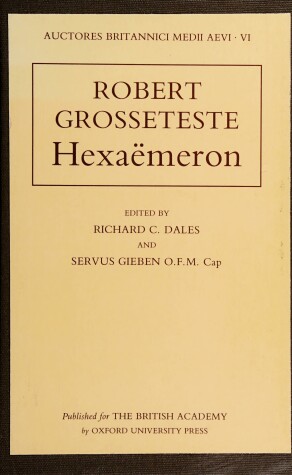Auctores Britannici Medii Aevi
2 primary works • 3 total works
VI
One of the products of a period of intense intellectual activity from about 1228 to 1235, this is a study of Genesis in the light of ancient and contemporary scientific writings. ` The editors are accomplished Grosseteste scholars and have utilized all known manuscripts of the work, including one that contains the author's own annotations and corrections. This critical edition marks the first time that the Hexa "emeron has been printed in its entirety, and it makes available the text of a work that is crucial for the understanding of philosophy and theology in the thirteenth century. ' Church History This book is intended for scholars and students of medieval philosophy, theology and literature.
X
Throughout his career, one of Robert Grosseteste's abiding concerns was the worthiness of pastors for the cure of souls. His De Decem Mandatis (probably dated in the early 1230s) exemplifies this concern. Couched - for Grosseteste - in simple, straightforward language, it abounds in illustrations in the first and second person singular, and was clearly intended as a guide to pastors faced with the everyday problems of imparting moral instruction to their flocks. It is largely free of the mind-bending argumentation so characteristic of his academic treatises, but is by no means a simple work. Grosseteste was a demanding instructor. In this work he had already begun to think about some of the themes which would play a large part in De Cessatione Legalium and Hexaemeron , but these ideas are still in a preliminary stage in De Decem Mandatis . His principal source is scripture itself, especially Ecclesiasticus, the Psalms, the Gospels and the Epistles. As his guide to understanding them Grosseteste relies most heavily on Augustine, and to a lesser extent on Ambrose, Jerome, and Isidore.
The only Greek father quoted is Chrysostom (and even this is a Latin translation), since Grosseteste's interest in Greek was still in its early stages. Somewhat surprisingly in a work of this sort, Seneca is used extensively, and other authors cited in Latin include Aristotle, Horace, Ovid, and Cicero. Philosophers; medievalists.
The only Greek father quoted is Chrysostom (and even this is a Latin translation), since Grosseteste's interest in Greek was still in its early stages. Somewhat surprisingly in a work of this sort, Seneca is used extensively, and other authors cited in Latin include Aristotle, Horace, Ovid, and Cicero. Philosophers; medievalists.
v.6(2)
Grosseteste is an important figure in the history of English learning, representing the last flowering of a fully native tradition of scholarship. His "Hexaemeron" is rare amongst works of this period in giving an insight into the medieval world view. A work of Grosseteste's early maturity (probably completed around 1235), it is a commentary on the early chapters of Genesis, on the six days of Creation, and gives him a context for expounding his attitude to theology, to the world, and to the place of human beings in that world. The book is a compilation and reconciliation of conflicting Greek and Latin authorities, handled with great confidence, which gives an account of the unity of medieval learning, where the study of God includes the study of the whole world. This translation complements the Latin text edition of the "Hexaemeron" by Dales and Gieben. It should be of interest to scholars and students of Medieval philosophy, theology and literature.

